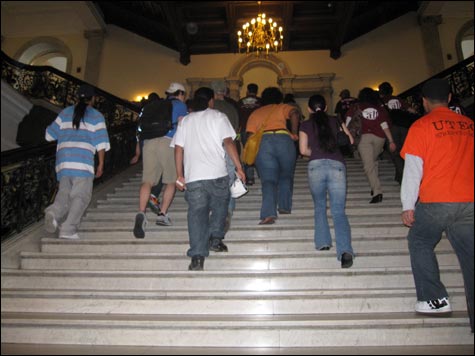
CHILDREN'S CRUSADE: Teens opposing summer-job budget cuts — including the ones here from Lowell's United Teen Equality Center — face a long, hard climb on Beacon Hill |
While the economy has given us a collective jackboot to the groin, it has also seemingly stirred a civil discontent. This past week saw not one but at least three public demonstrations of protest. As state reps wrestled over cash, hordes of seniors, labor crusaders, and other garden-variety citizens filled State House hallways cheering, jeering, and clashing with security guards who were visibly aggravated by the benevolent mobs. The Phoenix hustled to the scene — as well as to Chinatown and East Boston — with pens and notepads drawn, listening to whomever howled the loudest.
Summer bloody summer
There will be blood. Lots of it. As well as more drugs, brutality, and urban turbulence. All this — youth workers claim— if summer-jobs funding gets axed, which already happened to the tune of more than $10 million before the state-budget process advanced from the House to the Senate.
Considering the current economic disaster and recent rash of workplace massacres, there seems to be an unfortunate relationship between violent crime and unemployment. That phenomenon especially holds true for teenagers, who, experts say, engage in riskier behavior when there are fewer jobs to entertain them.
On Monday, folks from such groups as the Hyde Square Task Force overflowed the B-1 hearing room at the State House and spilled into a basement hallway, where one guard threatened to eject chatty activists for disturbing lawmakers. By Wednesday morning, security was fuming, as constituent swarms buzzed during unusually long waits at both public entrances.
Though pending 2010 budget cuts will not affect teen programming this summer, youth advocates reacted urgently after the House budget — which initially proposed to slash anti-violence funds by more than $25 million — was released on April 15. In Boston, 120 organizations united behind the High Risk Youth Network, whose chief coordinator, former street worker Talia Rivera, said at the time, "A lot of young people will suffer greatly because of this. Without jobs, what will some of them do besides get into trouble? There already weren't enough jobs."
Rivera's hardcore lobbying paid off some; on Wednesday night, her House allies saved $8 million of the proposed cuts to summer jobs. That money — which pays for about half of the 3700 positions commissioned by Mayor Tom Menino's Boston Youth Fund summer-jobs program— was the only major victory for violence-prevention efforts. Some relatively small subsidies for mentoring and YMCA programs were restored, but $6.5 million in anti-gang grants were ultimately cut, as was Department of Public Health funding for 28 programs that service 5000 kids at sanctuaries like the Hyde Square Task Force and the Dorchester Youth Collaborative.
Teen-employment advocates faced daunting trends before this latest struggle. A 2008 report by the Center for Labor Market relations at Northeastern University found that last summer saw the lowest national teen-employment rate since 1948. In 2000, more than 7 million young adults between 16 and 19 had jobs; by 2007 that number dropped to around 6 million, despite the population of that age group rising nearly 10 percent. With budget crises like the one in Massachusetts consuming state legislatures across the country, observers predict the number of employed youth to continue tumbling.